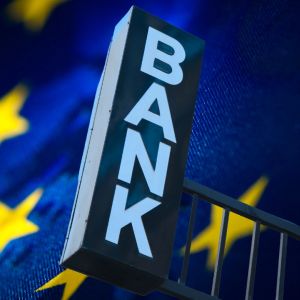Shares of the biggest banks in Europe have jumped to levels not seen since the 2008 financial crash, driven by a sharp rise in long-term interest rates that’s turning into serious earnings growth. HSBC, which trades in London, hit a record high just before releasing its second-quarter earnings this week. Barclays and Santander both climbed to their highest since 2008. In Italy, UniCredit surged to a peak it hadn’t reached since 2011. Even with a pullback after President Donald Trump announced new tariffs on dozens of countries on Friday, the banking sector on the Stoxx 600 is still up 34% for the year. That’s not only ahead of U.S. banks but also better than the sector’s performance in 2021, and it could become their strongest run since 2009. The growth stands out because this sector was once seen as a lost cause in global markets. “Europe’s banks have shifted from pariah status to market darlings,” said Justin Bisseker, a European banks analyst at Schroders. He said the turnaround is tied to three things: “the transformative impact on revenues of higher interest rates,” a stable economy, and internal cost-cutting by banks to become more efficient. Higher long-term rates lift net interest income Long-term borrowing costs in Europe are now climbing faster than short-term ones. This is key for banks because it boosts their net interest income, which is the gap between what they earn on loans and what they pay depositors. In Germany, 30-year bond yields are now 1.3 percentage points higher than two-year yields. In the UK, the difference is even wider at 1.5 percentage points. That steep curve didn’t exist just two years ago. Back then, the long-term rates were actually below short-term ones, making it hard for banks to profit off lending. The reversal started after the COVID-19 pandemic, when central banks began hiking interest rates to fight off inflation and cut back on their massive bond-buying programs. Source: FT Markets Some lenders are also gaining from volatile financial markets triggered by Trump’s trade policies. The latest wave of tariffs sparked sharp market moves that gave banks with trading desks a big advantage in earnings. Still, even with these new sources of revenue, there’s uncertainty about how long the ride will last. The current earnings momentum depends heavily on long-term rates staying elevated, something nobody can guarantee. While HSBC shares slid slightly after its Q2 earnings failed to meet expectations on Wednesday, they still sit at the highest point since 2001. Valuations rise, but sector faces political roadblocks For the first time in years, banks across Europe are being valued at their book value, meaning their stock price matches the value of their assets. By comparison, JPMorgan trades at 2.4 times book value, while Goldman Sachs trades at 2 times. That discount is pulling more investors in. “These banks are cheap and uniquely positioned for a pick-up in domestic demand,” said Luca Paolini, chief strategist at Pictet Asset Management. Part of the draw is economic optimism. If the European economy keeps improving, banks could see stronger loan growth. But not everyone is convinced the boom will keep going. Francesco Sandrini, global head of multi-asset strategies at Amundi, warned that “banks appear the cleanest shirt in the basket,” but also added there’s “a growing feeling the best may be past.” He said analysts have waited years for major bank consolidation to shake up the sector, but it just hasn’t happened. Efforts to merge banks are running into political blocks. BBVA’s plan to acquire Sabadell was met with pushback. So was UniCredit’s attempt to buy BPM. Without these deals, the industry’s ability to expand or compete more aggressively is limited. Meanwhile, banks have tried to reduce their reliance on interest rates by expanding into wealth management, but that shift hasn’t been tested under falling rates yet. Whether those strategies will work if rate hikes slow down remains to be seen. Even with doubts, key performance metrics look stronger than they’ve been in years. Many banks are reporting return on tangible equity above 10%, a milestone that was out of reach during the low-rate era. They’re also trading at 10 times forward earnings, while U.S. competitors sit above 13 times, based on Bloomberg’s numbers. Cryptopolitan Academy: Coming Soon - A New Way to Earn Passive Income with DeFi in 2025. Learn More















